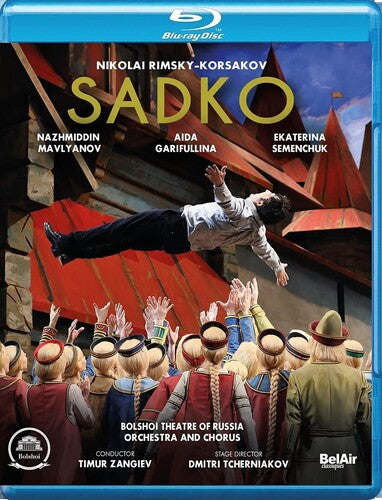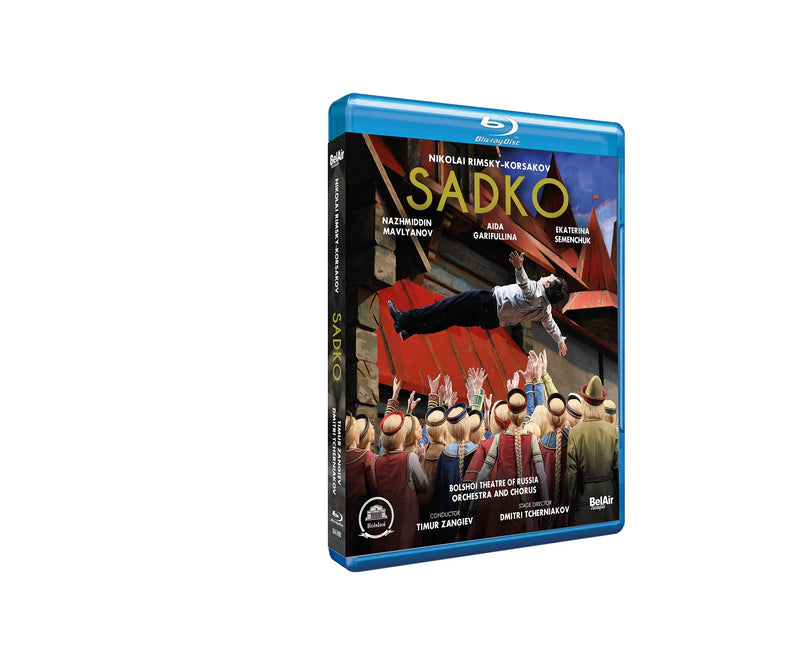Nikolai Rimsky-Korsakov
57 products
-
 {# optional: put hover video/second image here positioned absolute; inset:0 #}
Divine Art
{# optional: put hover video/second image here positioned absolute; inset:0 #}
Divine ArtRimsky-korsakov For Piano Duo: Scheherazade; Antar; Neapolitan Song
Nikolai Rimsky-Korsakov arranged his most famous work, Scheherazade, and the little jolly Neapolitan Song, op. 63, for piano four hands.
-
 {# optional: put hover video/second image here positioned absolute; inset:0 #}
On SaleBIS
{# optional: put hover video/second image here positioned absolute; inset:0 #}
On SaleBISRimsky-Korsakov: Antar, Scheherazade / Bakels, Malaysian Philharmonic
Having recently recorded the symphonies of both Glazunov and Rachmaninov, we continue our Russian theme with the first of a series of...
-
 {# optional: put hover video/second image here positioned absolute; inset:0 #}
Naxos
{# optional: put hover video/second image here positioned absolute; inset:0 #}
NaxosRimsky-Korsakov: 1001 Nights / Cribbins
This is a Spoken Word album:"Sinbad" and other exotic tales narrated by Bernard Cribbins over music by Rimsky-Korsakov.
-
 {# optional: put hover video/second image here positioned absolute; inset:0 #}
BelAir Classiques
{# optional: put hover video/second image here positioned absolute; inset:0 #}
BelAir ClassiquesGolden Cockerel
The old Tzar Dodon, tired of ruling his country, manipulated by his political advisors - among which the obscure Astrologer - and...
-
 {# optional: put hover video/second image here positioned absolute; inset:0 #}
Reference Recordings
{# optional: put hover video/second image here positioned absolute; inset:0 #}
Reference RecordingsRimsky-korsakov: Scheherazade, Etc / Serebrier, London Po
This selection is a High Definition Compatible Digital (HDCD) recording.
-
 {# optional: put hover video/second image here positioned absolute; inset:0 #}
On SaleDUX
{# optional: put hover video/second image here positioned absolute; inset:0 #}
On SaleDUXRimsky-Korsakov: Kashchey the Immortal
In November 1900, the music journalist Yevgeny Petro-vsky gave Rimsky-Korsakov his libretto, entitled Prince Ivan, which is loosely based on Russian folk...
-
 {# optional: put hover video/second image here positioned absolute; inset:0 #}
On SaleNaxos
{# optional: put hover video/second image here positioned absolute; inset:0 #}
On SaleNaxosRimsky-korsakov: Christmas Eve, Etc / Golovschin, Moscow So
RIMSKY-KORSAKOV: Christmas Eve / Night on Mount Triglav
-
![Rimsky-Korsakov: Sadko / Zangiev, Bolshoi Theater Orchestra [Blu-ray]](//arkivmusic.com/cdn/shop/files/4012964-2754030.jpg?v=1750779409&width=800) {# optional: put hover video/second image here positioned absolute; inset:0 #}
On SaleBelAir Classiques
{# optional: put hover video/second image here positioned absolute; inset:0 #}
On SaleBelAir ClassiquesRimsky-Korsakov: Sadko / Zangiev, Bolshoi Theater Orchestra [Blu-ray]
In the 13th century, the rich merchants of Novgorod mock the dreams of far-away journeys and of commercial conquests brought forth by...
-
![Rimsky-Korsakov: Sadko / Zangiev, Bolshoi Theater Orchestra [DVD]](//arkivmusic.com/cdn/shop/files/4012963-2758657.jpg?v=1749373836&width=800) {# optional: put hover video/second image here positioned absolute; inset:0 #}
On SaleBelAir Classiques
{# optional: put hover video/second image here positioned absolute; inset:0 #}
On SaleBelAir ClassiquesRimsky-Korsakov: Sadko / Zangiev, Bolshoi Theater Orchestra [DVD]
In the 13th century, the rich merchants of Novgorod mock the dreams of far-away journeys and of commercial conquests brought forth by...
-
 {# optional: put hover video/second image here positioned absolute; inset:0 #}
Opus Arte
{# optional: put hover video/second image here positioned absolute; inset:0 #}
Opus ArteRimsky-Korsakov: Legend of the Invisible City of Kitezh / Albrecht, Netherlands Opera Philharmonic
Note: The Blu-ray version is only playable on Blu-ray Disc players and not compatible with standard DVD players. Rimsky-Korsakov’s opera is a...
-
 {# optional: put hover video/second image here positioned absolute; inset:0 #}
On SaleSony Masterworks
{# optional: put hover video/second image here positioned absolute; inset:0 #}
On SaleSony MasterworksLeonard Bernstein - The Royal Edition Vol 67 - Stravinsky, Rimsky-Korsakov
..."Dance of the Firebird"...is much more nimble and airy in Leonard Bernstein's performance, possibly because the American opts for the better-known 1919...
-
 {# optional: put hover video/second image here positioned absolute; inset:0 #}
Profil
{# optional: put hover video/second image here positioned absolute; inset:0 #}
ProfilRimsky-Korsakov: Complete Operas & Fragments / Soloists of the Bolshoi
Rimsky-Korsakov´s musical legacy made a huge impact and stretches far into the twentieth century. Even if the language barrier makes full understanding...




 {# optional: put hover video/second image here positioned absolute; inset:0 #}
{# optional: put hover video/second image here positioned absolute; inset:0 #}

 {# optional: put hover video/second image here positioned absolute; inset:0 #}
{# optional: put hover video/second image here positioned absolute; inset:0 #}

 {# optional: put hover video/second image here positioned absolute; inset:0 #}
{# optional: put hover video/second image here positioned absolute; inset:0 #}


 {# optional: put hover video/second image here positioned absolute; inset:0 #}
{# optional: put hover video/second image here positioned absolute; inset:0 #}

 {# optional: put hover video/second image here positioned absolute; inset:0 #}
{# optional: put hover video/second image here positioned absolute; inset:0 #}


 {# optional: put hover video/second image here positioned absolute; inset:0 #}
{# optional: put hover video/second image here positioned absolute; inset:0 #}

 {# optional: put hover video/second image here positioned absolute; inset:0 #}
{# optional: put hover video/second image here positioned absolute; inset:0 #}


![Rimsky-Korsakov: Sadko / Zangiev, Bolshoi Theater Orchestra [Blu-ray]](http://arkivmusic.com/cdn/shop/files/4012964-2754030.jpg?v=1750779409&width=800) {# optional: put hover video/second image here positioned absolute; inset:0 #}
{# optional: put hover video/second image here positioned absolute; inset:0 #}


![Rimsky-Korsakov: Sadko / Zangiev, Bolshoi Theater Orchestra [DVD]](http://arkivmusic.com/cdn/shop/files/4012963-2758657.jpg?v=1749373836&width=800) {# optional: put hover video/second image here positioned absolute; inset:0 #}
{# optional: put hover video/second image here positioned absolute; inset:0 #}




 {# optional: put hover video/second image here positioned absolute; inset:0 #}
{# optional: put hover video/second image here positioned absolute; inset:0 #}

 {# optional: put hover video/second image here positioned absolute; inset:0 #}
{# optional: put hover video/second image here positioned absolute; inset:0 #}


 {# optional: put hover video/second image here positioned absolute; inset:0 #}
{# optional: put hover video/second image here positioned absolute; inset:0 #}